Professor, Biomedical Informatics and Medical Education
Chief Research Information Officer (CRIO) of UW Medicine
Principal Investigator
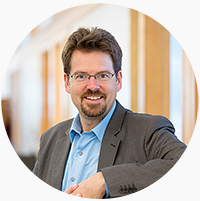 Professor Mooney has spent his career as a researcher and group leader in biomedical informatics. He now leads research IT for UW Medicine and is leading efforts to support and build clinical informatics platforms as it’s first Chief Research Information Officer (CRIO) and as a professor in the Department of Biomedical Informatics and Medical Education at the University of Washington. Previous to his CRIO role, he was an Associate Professor and Director of Bioinformatics at the Buck Institute for Research on Aging. As an Assistant Professor, he was appointed in Medical and Molecular Genetics at Indiana University School of Medicine and was founder and director of the Indiana University School of Medicine Bioinformatics Core. In 1997, he received his B.S. with Distinction in Biochemistry and Molecular Biology from the University of Wisconsin at Madison, then receiving a Ph.D. in 2001 at the University of California in San Francisco, and then an American Cancer Society John Peter Hoffman Fellowship at Stanford University.
Professor Mooney has spent his career as a researcher and group leader in biomedical informatics. He now leads research IT for UW Medicine and is leading efforts to support and build clinical informatics platforms as it’s first Chief Research Information Officer (CRIO) and as a professor in the Department of Biomedical Informatics and Medical Education at the University of Washington. Previous to his CRIO role, he was an Associate Professor and Director of Bioinformatics at the Buck Institute for Research on Aging. As an Assistant Professor, he was appointed in Medical and Molecular Genetics at Indiana University School of Medicine and was founder and director of the Indiana University School of Medicine Bioinformatics Core. In 1997, he received his B.S. with Distinction in Biochemistry and Molecular Biology from the University of Wisconsin at Madison, then receiving a Ph.D. in 2001 at the University of California in San Francisco, and then an American Cancer Society John Peter Hoffman Fellowship at Stanford University.
Tim Bergquist
BIME PhD Student
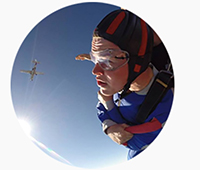 Starting his third year as a PhD student at the University of Washington, Tim Bergquist is interested in developing methods for enabling the Learning Healthcare system. Tim has been involved in facilitating community challenges like the Critical Assessment of Functional Annotation and the Critical Assessment of Genome Interpretation and is interested in exploring and evaluating crowd sourced solutions to other biomedical questions. He received his BS in Biochemistry from Grove City College in 2015 and worked as a research assistant at the University of Washington before starting the graduate program.
Starting his third year as a PhD student at the University of Washington, Tim Bergquist is interested in developing methods for enabling the Learning Healthcare system. Tim has been involved in facilitating community challenges like the Critical Assessment of Functional Annotation and the Critical Assessment of Genome Interpretation and is interested in exploring and evaluating crowd sourced solutions to other biomedical questions. He received his BS in Biochemistry from Grove City College in 2015 and worked as a research assistant at the University of Washington before starting the graduate program.
Houda Benlhabib
NLM Senior Fellow
 Houda obtained her Ph.D. in Biochemistry, Molecular Biology and Biophysics from the University of Minnesota. Her thesis work focused on the transcriptional regulation of the Oncoprotein 18/Stathmin during cell cycle. She carried out her postdoctoral training at the University of Texas Southwestern Medical Center (UT Southwestern) where her research focused on developmental and hormonal regulation of epigenetic changes surrounding the gene encoding the major surfactant protein in alveolar type II cells in fetal lung. She also investigated the roles of microRNAs in the regulation of alveolar type II cell differentiation and surfactant synthesis. Her main goal in her current fellowship is to learn computational biology and apply machine learning to build prediction tools to solve biological problems related to aging, women and child health using EHR. Besides her scientific background, Houda enjoys hiking, martial arts, the art of cooking and spending time with her son. Houda cares about several causes including Arts and Culture, Children, Education, Environment, Health, Science and Technology.
Houda obtained her Ph.D. in Biochemistry, Molecular Biology and Biophysics from the University of Minnesota. Her thesis work focused on the transcriptional regulation of the Oncoprotein 18/Stathmin during cell cycle. She carried out her postdoctoral training at the University of Texas Southwestern Medical Center (UT Southwestern) where her research focused on developmental and hormonal regulation of epigenetic changes surrounding the gene encoding the major surfactant protein in alveolar type II cells in fetal lung. She also investigated the roles of microRNAs in the regulation of alveolar type II cell differentiation and surfactant synthesis. Her main goal in her current fellowship is to learn computational biology and apply machine learning to build prediction tools to solve biological problems related to aging, women and child health using EHR. Besides her scientific background, Houda enjoys hiking, martial arts, the art of cooking and spending time with her son. Houda cares about several causes including Arts and Culture, Children, Education, Environment, Health, Science and Technology.
Chethan Jujjavarapu
BIME PhD Student
 Chethan is a computational biologist and PhD student in the Biomedical and Health Informatics Department. He graduated from UC Santa Cruz with a focus in Immunology, but transitioned to computational biology and data science at UC San Francisco, where he spent almost 2 years working on different projects to build and hone his computational skills. He’s now focused on leveraging the wealth of knowledge in the UW EHR to improve diagnosis and treatments for autoimmune patients.
Chethan is a computational biologist and PhD student in the Biomedical and Health Informatics Department. He graduated from UC Santa Cruz with a focus in Immunology, but transitioned to computational biology and data science at UC San Francisco, where he spent almost 2 years working on different projects to build and hone his computational skills. He’s now focused on leveraging the wealth of knowledge in the UW EHR to improve diagnosis and treatments for autoimmune patients.
Vikas Pejaver
eScience Fellow
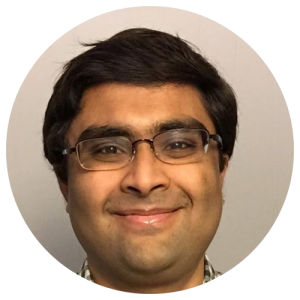 Vikas Rao Pejaver is a Moore-Sloan and Washington Research Foundation post-doctoral fellow in the Mooney lab and the eScience Institute. He is interested in the development and application of machine learning methods for translational research, with a particular emphasis on the integration of heterogeneous data from disparate sources, such as genomic, proteomic and health data sets. The use of computational methods in the health and life sciences first excited Vikas at the People’s Education Society Institute of Technology, where he received his B.E. in Biotechnology in 2008. This motivated him to pursue an M.S. in Bioinformatics at Indiana University, Bloomington, where he worked on comparative genomics problems in bacterial genomes. Upon completion in 2010, he stayed on at Indiana to pursue doctoral studies in Dr. Predrag Radivojac’s research group. In 2016, he received a Ph.D. in Informatics with a dissertation that focused on the sequence-based prediction of over 50 different types of structurally and functionally important sites in proteins, and their integration into the prediction of disease-associated missense variants. In the Mooney lab, he continues to think about machine learning in human health and disease, but with a greater focus on electronic health records.
Vikas Rao Pejaver is a Moore-Sloan and Washington Research Foundation post-doctoral fellow in the Mooney lab and the eScience Institute. He is interested in the development and application of machine learning methods for translational research, with a particular emphasis on the integration of heterogeneous data from disparate sources, such as genomic, proteomic and health data sets. The use of computational methods in the health and life sciences first excited Vikas at the People’s Education Society Institute of Technology, where he received his B.E. in Biotechnology in 2008. This motivated him to pursue an M.S. in Bioinformatics at Indiana University, Bloomington, where he worked on comparative genomics problems in bacterial genomes. Upon completion in 2010, he stayed on at Indiana to pursue doctoral studies in Dr. Predrag Radivojac’s research group. In 2016, he received a Ph.D. in Informatics with a dissertation that focused on the sequence-based prediction of over 50 different types of structurally and functionally important sites in proteins, and their integration into the prediction of disease-associated missense variants. In the Mooney lab, he continues to think about machine learning in human health and disease, but with a greater focus on electronic health records.
Jimmy Phuong
BIME PhD Student
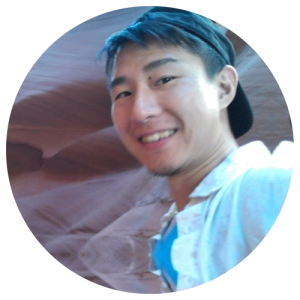 Jimmy is a computational scientist and PhD student in the UW Biomedical and Health Informatics program. His research is focused on data integration and analytics, currently applied in the biology of Aging and the geospatial informatics of environmental health. Jimmy received his bachelors of science in Molecular Toxicology from UC Berkeley in 2010, and his Masters in Science in Public Health from UNC Chapel Hill in 2014. Prior to joining Mooney Lab, Jimmy worked at the US EPA ToxCast and Tox21 toxicity testing programs in bioassay annotation and integration as well as a number of Public Health projects pertaining to environmental toxicants and computational prediction. In his free time, Jimmy likes long walks on the beach, hiking, and exploring through music and movie archives.
Jimmy is a computational scientist and PhD student in the UW Biomedical and Health Informatics program. His research is focused on data integration and analytics, currently applied in the biology of Aging and the geospatial informatics of environmental health. Jimmy received his bachelors of science in Molecular Toxicology from UC Berkeley in 2010, and his Masters in Science in Public Health from UNC Chapel Hill in 2014. Prior to joining Mooney Lab, Jimmy worked at the US EPA ToxCast and Tox21 toxicity testing programs in bioassay annotation and integration as well as a number of Public Health projects pertaining to environmental toxicants and computational prediction. In his free time, Jimmy likes long walks on the beach, hiking, and exploring through music and movie archives.
Abhishek(Abhi) Pratap
BIME PhD Student & Research Consultant
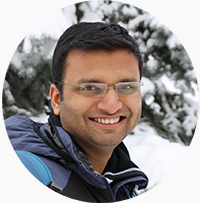 Abhi is a computational biologist with 7 years of professional experience in the analysis of high-throughput genomics and proteomics datasets and biological data visualization. He has worked on analyzing data from various sequencing technologies such as Illumina, Roche-454 and Pacific Biosciences developing end-to-end integrated analysis pipelines for genome assembly, variant calling, differential expression etc. Currently at Sage Bionetworks, he is leading the data analysis and management in two consortium based projects working in Neurofibromatosis – II and Acute Myeloid Leukemia. These involve careful data access management, providing researchers with protected workspaces for sharing results and provenance enabled statistical analysis. He also builds interactive data dashboards to share his analysis thereby enabling biologists, clinicians explore multidimensional biomedical data. Currently as a first year graduate student in Biomedical Health Informatics, Abhi is exploring research areas in use of mobile health technologies specially in low income groups. His long term interests is in developing solutions to help patients take control of their own health and working with their healthcare provider for better overall outcomes.
Abhi is a computational biologist with 7 years of professional experience in the analysis of high-throughput genomics and proteomics datasets and biological data visualization. He has worked on analyzing data from various sequencing technologies such as Illumina, Roche-454 and Pacific Biosciences developing end-to-end integrated analysis pipelines for genome assembly, variant calling, differential expression etc. Currently at Sage Bionetworks, he is leading the data analysis and management in two consortium based projects working in Neurofibromatosis – II and Acute Myeloid Leukemia. These involve careful data access management, providing researchers with protected workspaces for sharing results and provenance enabled statistical analysis. He also builds interactive data dashboards to share his analysis thereby enabling biologists, clinicians explore multidimensional biomedical data. Currently as a first year graduate student in Biomedical Health Informatics, Abhi is exploring research areas in use of mobile health technologies specially in low income groups. His long term interests is in developing solutions to help patients take control of their own health and working with their healthcare provider for better overall outcomes.
Sicheng Song
BIME PhD Student
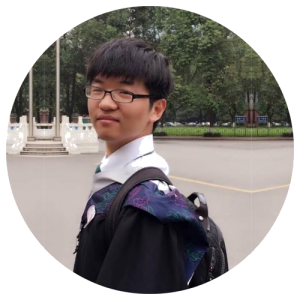 Graduated from biological science in Sichuan University, Sicheng is now a PhD student in Biomedical Health Informatics program. During his research internships with the state key laboratory of biotherapy and cancer center in China with publishing 5 research papers (total IF=17.45), he has developed an interest in translational bioinformatics and systems biology, such as personalized medicine and cancer genomics. Outside of the lab, he loves kendo, hiking, soccer, skiing and archery.
Graduated from biological science in Sichuan University, Sicheng is now a PhD student in Biomedical Health Informatics program. During his research internships with the state key laboratory of biotherapy and cancer center in China with publishing 5 research papers (total IF=17.45), he has developed an interest in translational bioinformatics and systems biology, such as personalized medicine and cancer genomics. Outside of the lab, he loves kendo, hiking, soccer, skiing and archery.
Samir Yhann
Undergraduate Student
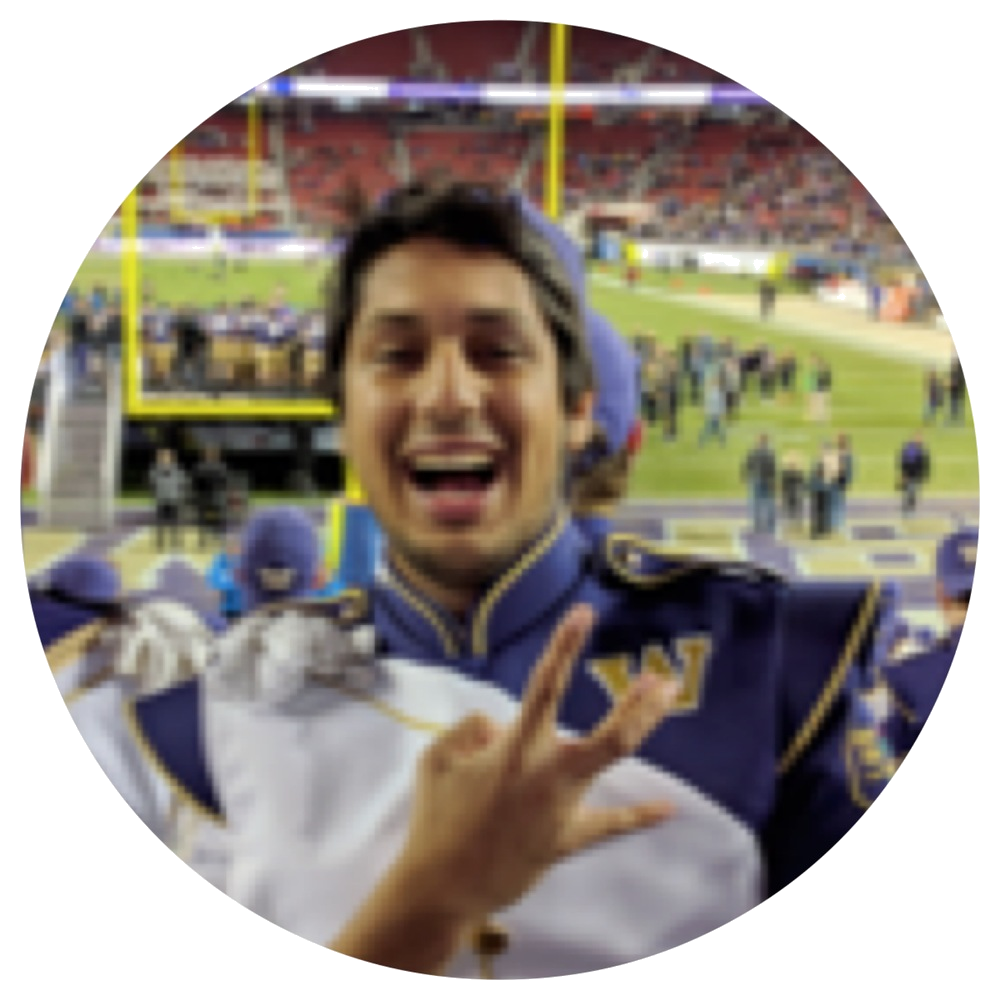 Samir is a sophomore undergrad at the University of Washington working on a degree in engineering and physics. He joined the group in the fall of 2016 to work with databases and data visualization. In his free time Samir plays with the Husky Marching Band, explores the wilderness, and programs small apps for fun.
Samir is a sophomore undergrad at the University of Washington working on a degree in engineering and physics. He joined the group in the fall of 2016 to work with databases and data visualization. In his free time Samir plays with the Husky Marching Band, explores the wilderness, and programs small apps for fun.
Yao Yan
Molecular Engineering PhD Student
 Yao graduated with a B.Eng. in Polymer Science and Engineering (biomedicine track) from Sichuan University, China in 2018. She is currently pursuing a Ph.D. in Molecular Engineering at the University of Washington under the mentorship of Dr.Sean Mooney and Dr.Justin Guinney. Her research interests focus on utilization and interpretation of EMR and She is currently working on building predictive clinical models.
Yao graduated with a B.Eng. in Polymer Science and Engineering (biomedicine track) from Sichuan University, China in 2018. She is currently pursuing a Ph.D. in Molecular Engineering at the University of Washington under the mentorship of Dr.Sean Mooney and Dr.Justin Guinney. Her research interests focus on utilization and interpretation of EMR and She is currently working on building predictive clinical models.
Noah Hammarlund
Post-Doctoral Fellow
 Noah Hammarlund received his PhD in Health Policy from Indiana University in 2018 where he studied health economics and machine learning while teaching a number of courses including health economics and statistics. Noah's research merges the innovations of machine learning and applied health economics to better understand and improve healthcare delivery. A native of the PNW, Noah was happy to join the Mooney Lab and UW where he can enjoy scientific research as well as the best of the city and surrounding beauty.
Noah Hammarlund received his PhD in Health Policy from Indiana University in 2018 where he studied health economics and machine learning while teaching a number of courses including health economics and statistics. Noah's research merges the innovations of machine learning and applied health economics to better understand and improve healthcare delivery. A native of the PNW, Noah was happy to join the Mooney Lab and UW where he can enjoy scientific research as well as the best of the city and surrounding beauty.
